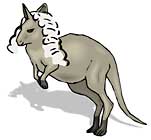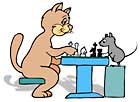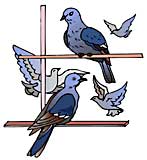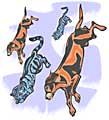|
Codfish aristocracy
Originated in Massachusetts
in the 1840s and refers to a class of nouveau riche who had acquired wealth from the codfishing industry.
Sacred cow
Any personal possession or
person held in such high esteem as to be above criticism or attack. This 20th century term most probably derives from the
sacred cow of India and the legend of Prithu, who assumed the form of a cow in order to encourage his subjects to raise edible
vegetables.
Like Hogan’s goat
The name of the owner has no bearing whatever on the meaning of the expression. When one says that a given
anything is "like Hogan’s goat," one is just with reasonable courtesy saying that it "stinks terrifically."
  Like A Bat Out of Hell Like A Bat Out of Hell
Moving or
speaking with extreme speed. In use since the turn of the last century. A possible explanation is that because bats shun the
light, they would be in great haste to escape from the flames of lower regions.
To Flog A Dead Horse
To try to revive a feeling of interest that
has died; to engage in a fruitless undertaking. Origins unknown, but the French express it more literally: to seek to resuscitate
a corpse. (chercher a ressusciter un mort)
Putting On The Dog
Making pretensions of grandeur; assuming airs. American slang from the 1860s. We perhaps owe this phrase
to the King Charles Spaniels, who were at the height of their popularity during that period and were smooth, popular and very
aristocratic looking dogs.
 Stool Pigeon Stool Pigeon
An informer
or telltale; a decoy used by the police to trap a wrongdoer. In the literal sense of a decoy pigeon it was in use by American
hunters early in the 19th century. And fowlers used the term "stool-crow", a similar decoy for crows. It is fairly certain
that "stool" as used here was formerly written "stale", which also meant a living bird used to attract others of its kind.
Pussy foot
While Theodore Roosevelt
did use and popularize this term, he did not invent it. Pussyfoot, which means a delicate soft step comes from the imagery
of a cat's careful tread. To pussyfoot is to proceed with caution. The term is American in origin and dates back at least
to 1893. It also means someone who advocates prohibition; a teetotaler. This usage derives from William E. "Pussyfoot" Johnson,
a prohibitionist who traveled to London in 1916 to spread the good word.
Cat O' Nine Tails
Came into use in the late 17th century. A 1788
description says it consists of a handle or stem made of rope 3-1/2 inches in circumference and about 18 inches in length,
at one end of which are fastened 9 branches or tails with three or more knots upon each branch. Actually authorized as an
instrument of punishment in the British navy until 1881.

Kangaroo court
This
term, meaning a legal proceeding that is conducted only for show and where the defendant is inevitably going to be found guilty,
is not of Australian origin. The earliest use of the term was recorded in Texas, circa 1850. The term kangaroo court was unknown
in Australia until it was brought there from America. Some suggest that the name may have arisen from the way a kangaroo court
defies the law, just as a kangaroo’s appearance seems to defy the laws of nature.
Cold turkey
This phrase meaning without preparation
dates back to 1910. Its use in relation to withdrawal from an addictive substance (heroin) dates back to around 1922. The
derivation stems from the idea that cold turkey is a food that requires little preparation in the kitchen. Thus to quit cold
turkey is to do so suddenly and without preparation.
Kitty-corner
The term was originally cattercorner. Cater is an old term meaning diagonal. It derives
from the French quatre or four. Cater dates back to the early 16th century. Since this origin is not self-evident and
the term sounds strange, over the years it became catty-corner or kitty-corner.
 Monkey wrench Monkey wrench
Either English
or American. In a book called: "A Book About A Thousand Things" (1946), author, Simpson believed it was derived by a London
blacksmith named Charles Moncke and that monkey wrench was a corruption of "Moncke’s Wrench."
Duck soup
Extremely
easy, easy as rolling off a log; hence, a cinch. American slang of some 25 years standing. Probably derived from a "sitting
duck", namely one easily shot by a hunter. Figuratively, an easy mark, any perosn who lays himself wide open to ridicule or
any form of attack.
Love me, love my dog
Whatever my faults, if you love me you must put up with them. Very old expression. First found in the Latin
12th century writings of St. Clairvaux. Qui me amat, amat et canem meum. It also occurs in the words of various English
writers of the 15th and 16th centuries.
 To cry wolf To cry wolf
To feign danger. From
the famous Aesop Fable about the shepherd boy who played around, crying "wolf" when there was none, for a laugh on
his friends. Of course, they wouldn't help him when the wolf really came. Thus, a person who lies is not believed when he's
finally telling the truth.
A snake in the grass
A hidden danger. A proverb which comes to us from Vergil (70-19 BC). Early English translation is kind
of fun: "But the serpent lurked vnder the grasse, and vnder sugered speache was hide pestiferous poyson." Interesting
that the French put the snake under a rock, as "quelque anguille sous roche".
Dead as a herring
Really and truly dead. A dead fish smells bad,
but a dead herring smells excessively foul. Perhaps why dead herrings are used in the teaching of young dogs to follow a scent.
Probably also a variation of "dead as a doornail" from the 16th century.
 To play cat and mouse To play cat and mouse
This phrase came
into popular use in England in 1913 during suffragette agitation.
To
go hog wild
Dates back to 1904 where in The Dialect Notes it is defined as
to "become highly enthusiastic" as hogs do when they are aroused.
Lame
duck
Anything played out or done up. This expression comes from Revolutionary times
and the phrase, "Never waste powder on a dead duck." It was modified by the 20th amendment in 1933 to concern members of Congress
who might not be re-elected, but still hold office. They would, thereby, not be dead but lamed in their legislative powers.

Birds of a Feather Flock Together
This
proverb of biblical origins indicates that similar people tend to associate with each other. It is not known if "It Takes
One To Know One" has the same roots or is just a run of the mill, copy cat expression.
Let The Cat Out of The Bag
This expression which means to disclose
something that has been kept secret dates back about four hundred years. It refers to unscrupulous merchants who misrepresented
their wares unless a sharp housewife demanded to see the contents of their "bags."
Eager Beaver
The simile "to work like a beaver" is some two hundred
years old and refers to an individual who is particularly and somewhat offensively avid in his or her industry.
Raining Cats and Dogs
 Its origin is unknown, but its first recorded use is by Jonathan Swift in Polite Conversation,
written circa 1708 and published some thirty years later. This work is a satire on cliches. An earlier variant of the phrase
"raining dogs and polecats" came from Richard Brome's The City of Wit of 1652. Its origin is unknown, but its first recorded use is by Jonathan Swift in Polite Conversation,
written circa 1708 and published some thirty years later. This work is a satire on cliches. An earlier variant of the phrase
"raining dogs and polecats" came from Richard Brome's The City of Wit of 1652.
Charley Horse
This term for a pulled muscle was originally a baseball term.
dating back at least to 1888. Its origin is obscure and no one knows who Charley was or why he may or may not have had a lame
horse.
Dog eat Dog
It's
a dog eat dog world appears in 1931, meaning of course, that the world is a tough place. Possible origin may be a play
on an old proverb that states "dog does not eat dog."
|

Woman's translations
 
The wife says: You want
The wife means: You want
The wife says: We need
The wife means:
I want
The wife says: It's your decision
The wife means: The correct decision should be obvious
The
wife says: Do what you want
The wife means: You'll pay for this later
The wife says: We need to
talk
The wife means: I need to complain
The wife says: Sure... go ahead
The wife means:
I don't want you to
The wife says: I'n not upset
The wife means: Of course I'm upset you moron
The
wife says: You're ... so manly
The wife means: You need a shave and sweat a lot
The wife says:
Be romantic, turn out the lights
The wife means: I have flabby thighs.
The wife says: This kitchen
is so inconvenient
The wife means: I want a new house.
The wife says: I want new curtains.
The
wife means: Also carpeting, furniture, and wallpaper!
The wife says: I need wedding shoes.
The wife
means: The other forty pairs are the wrong shade of white.
The wife says: Hang the picture there
The
wife means: No, I mean hang it there!
The wife says: I heard a noise
The wife means: I noticed
you were almost asleep.
The wife says: Do you love me?
The wife means: I'm going to ask for something
expensive.
The wife says: How much do you love me?
The wife means: I did something today you're not
going to like.
The wife says: I'll be ready in a minute.
The wife means: Kick off your shoes and take
an hour nap.
The wife says: Am I fat?
The wife means: Tell me I'm beautiful.
The wife says:
You have to learn to communicate.
The wife means: Just agree with me.
The wife says: Are you listening
to me?
The wife means: [Too late, your doomed.]
The wife says: Yes
The wife means: No
The
wife says: No
The wife means: No
The wife says: Maybe
The wife means: No
The
wife says: I'm sorry
The wife means: You'll be sorry
The wife says: Do you like this recipe?
The
wife means: You better get used to it
The wife says: All we're going to buy is a soap dish
The wife
means: I'm coming back with enough to fill this place.
The wife says: Was that the baby?
The wife
means: Get out of bed and walk him
The wife says: I'm not yelling!
The wife means: Yes I am! I
think this is important!
In answer to the question "What's wrong?"
The wife says: The same old
thing.
The wife means: Nothing.
The wife says: Nothing.
The wife means: Everything.
The
wife says: Nothing, really.
The wife means: It's just that you're an idiot.
The wife says: I don't
want to talk about it.
The wife means: I'm still building up steam.


A man's translations
 
These translations are for all of you wonderful women out there, so that you will know what we really mean when we say...
"IT'S
A GUY THING"
Translated:* "There is no rational thought pattern connected with it, and you have no chance at all of
making it logical."
"CAN I HELP WITH DINNER?"
Translated:* "Why isn't it already on the table?"
"UH HUH,"
"SURE, HONEY," OR "YES, DEAR"
Translated:* Absolutely nothing. It's a conditioned response.
"IT WOULD TAKE TOO
LONG TO EXPLAIN"
Translated:* "I have no idea how it works."
"TAKE A BREAK, HONEY. YOU'RE WORKING TOO HARD."
Translated:*
"I can't hear the game over the vacuum cleaner."
"THAT'S INTERESTING, DEAR."
Translated:* "Are you still talking?"
"YOU
KNOW HOW BAD MY MEMORY IS."
Translated:* "I remember the theme song to 'F Troop,' the address of the first girl I ever
kissed and the vehicle identification numbers of every car
I've ever owned... but I forgot your birthday."
"OH,
DON'T FUSS, I JUST CUT MYSELF. IT'S NO BIG DEAL."
Translated:* "I have actually severed a limb but will bleed to death
before I admit that I'm hurt."
"HEY, I'VE GOT MY REASONS FOR WHAT I'M DOING."
Translated:* "And I sure hope
I think of some pretty soon."
"I CAN'T FIND IT."
Translated:* "It didn't fall into my outstretched hands, so
I'm completely clueless."
"WHAT DID I DO THIS TIME?"
Translated:* "What did you catch me at?"
"I'M NOT
LOST. I KNOW EXACTLY WHERE WE ARE."
Translated:* "No one will ever see us alive again."
"WE SHARE THE HOUSEWORK."
Translated:*
"I make the messes; she cleans them up." |
|
|
|
. |
|
|
|
